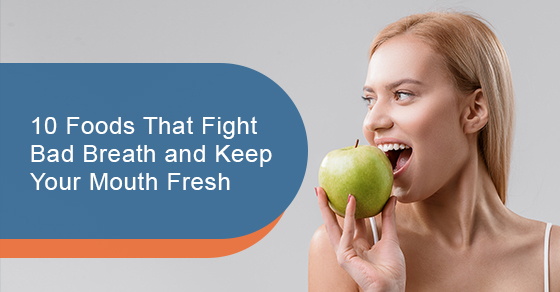Take a second to lick your wrist and let it dry. How does it smell? Roughly half of the world’s population experiences “halitosis” or, simply put, bad breath.
Bacteria in the mouth leftover from the food you eat can create unpleasant smells if not removed. Some food like garlic and onions contain smelly oils transported through the blood. Eventually, those oils reach the lungs, where you breathe them out when talking. Luckily, some foods have the opposite effect and fight bad breath.
You probably already include some of these foods in your diet, so employing them to fight bad breath is easy. Be sure to pick out some of your favourites from the list below for instant relief.
1. Raw fruits and vegetables
The abrasive power of fibre acts like a toothbrush and is great at keeping the mouth clean. Crunchy fruits and veggies that are chock full of fibre like celery, kale, apples, and carrots make the mouth produce more saliva when you eat them. The fibre in these foods also helps against bad breath by ensuring quick passage through the intestine.
High fibre fruits and veggies that are also high in vitamin C will fight bad breath more effectively. Anyone familiar with pirates and scurvy knows that vitamin C fights gum disease by preventing the growth of bacteria in the mouth.
2. Yogurt
The International & American Associations for Dental Research showed that eating three ounces of yogurt a day over six weeks reduced hydrogen sulphide by 80%. Hydrogen sulphide is more than a little unpleasant — it smells like rotting eggs.
Yogurt is a great food to add to your arsenal because it works to fight bad breath in multiple ways.
Dairy products like yogurt are typically high in vitamin D, which reduces bacteria growth in the body. Probiotic yogurt with good bacteria will also make your gut happy.
3. Spices and herbs
Long before chewing gum, people nibbled on natural herbs and spices to mask bad breath. The Greek physician Hippocrates, the father of Western medicine, created a mouth rinse from wine and herbs.
Any herb like parsley, spearmint or rosemary will work. Rosmarinic acid, named after rosemary, has significantly reduced garlic breath. Try making tea by boiling the leaves if you don’t like the idea of eating them raw.
4. Tea
Tea may not technically be food, but its odour-fighting properties simply can’t be ignored. Both green and black teas contain antioxidants that kill bacteria. Tea contains polyphenols that diminish the sulphur compounds that lead to bad breath.
Be careful not to drink too much black tea as it can lead to a dry mouth, making odours worse. Try having a cup between meals to keep your breath fresh and aid digestion.
5. Sugarless gum
Chewing gum is a tried-and-true method of masking bad breath. Gum helps remove stuck food with repetitive chewing and increases saliva production. Excess saliva cleans the mouth by washing away particles.
Remember that not all gum is equal! Gum that contains sugar can cause tooth decay and worsen bad breath, so opt for a sugar-free variety.
6. Water
You can keep your breath fresh by making sure you are adequately hydrated. Water will naturally wash away food particles, bacteria, and other odour-causing cells.
Since bacteria survive off the leftover food in your mouth— simply rinsing after a meal will aid in fighting bad breath. Try drinking around two litres of water each day.
7. Ginger
There’s a reason ginger is served as a palate cleanser at your local sushi spot. Ginger cleanses the palate with a host of odour-fighting compounds, the most potent being 6-gingerol. 6-gingerol activates enzymes in saliva that break down and neutralize those smelly sulphur compounds.
Fresh ginger will work better than processed, but both are effective. Chewing on a half-inch piece is more than enough.
8. Cherries
Cherries fight odours that cause bad breath like other fruits, but they have an added benefit. Methyl mercaptan is eliminated by compounds in cherries.
Cherries break up the rotten cabbage odour caused by methyl mercaptan, leaving the mouth smelling fresh. They’re also high in vitamin C and fibre.
9. Pickles
This one may seem counterintuitive, but it’s not the pickle doing the work. Pickle brine typically contains two antibacterial ingredients: dill and vinegar. Enjoy a few pickles as a side or pucker up for a small sip of the brine.
10. Dark chocolate or cacao
Just like gum, the key here is low-sugar content. Eating dark chocolate decreases mouth bacteria and avoids plaque build-up because of its reduced sugar. The compound CBH has been proven to prevent tooth decay by strengthening enamel. CBH is found naturally in cacao, but the amount reduces as it’s turned into chocolate.
Remember the odour fighting polyphenols in tea? Dark chocolate is rich in a polyphenol called catechin that effectively eliminates garlic breath. Try adding cacao powder to smoothies or cereal if you find it too bitter.
Be sure to buy cacao powder, not cocoa powder. They look similar, but cocoa powder has fewer nutrients because it is roasted at a higher temperature and is often mixed with sugar.
Bonus!: 5 Foods to Avoid
Prevention is better than cure, so here are the top five foods most likely to cause bad breath.
Remember that a good oral hygiene routine is the best defence against bad breath.
The tongue is responsible for about 85% of mouth odours, so try using a tongue scraper daily and avoiding the foods below for better breath.
- Garlic
- Horseradish
- Milk
- Onions
- Canned tuna
Whether you have bad breath because of a fishy lunch, morning breath or a medical condition, we can help. Our staff is always happy to answer questions and provide new and returning clients information.
For more information, call us at 647-371-1409 or contact us here.


Sorry, comments are closed for this post.